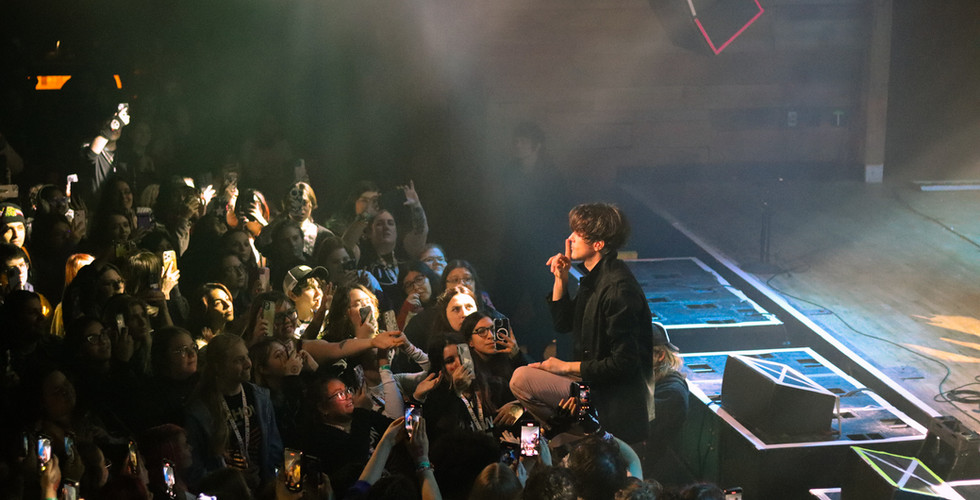The Death of Concert Etiquette?
- Synergy Magazine

- Jun 17
- 4 min read
By Lhea Smith | Photos By A. Finley Harrison |

Reminiscing on a time when concert tickets for major artists were less than today’s pair of shoes, a look at current live-music ticket prices may tempt individuals to gouge their eyes out—and yes, it’s that serious. The shift – which we predict to be caused by the internet, inflation and COVID-19 – has changed concert-going protocol, raising concerns over the integrity of today’s ticketing system and the concert-going experience altogether.
Prior to pre-dynamic pricing—a demand based pricing system where prices go up and down based on interest level—concertgoers weren’t full of Ticketmaster-queue or Apple ecosystem preparedness concerns, nor did they need to find presale codes on Reddit or Twitter. People stood in line at box offices, stayed on the phone for hours with radio stations to get a ticket, and even got tickets on their college campuses or record stores.
While there are some flaws in the older system, such as the time spent on getting a ticket, it still limited the bots/resellers and possible ‘fake fans’ of musicians impeding a ‘true’ fans’ ability to get a ticket. The older system is something we don’t know today, forcing us to only know the monopoly that is Ticketmaster and Live Nation, and possible two-star rated concerts that would’ve cost over $300 a person.
The development of the internet, and social media platforms such as Tik Tok and Instagram, has made musicians tours more accessible to fans – you no longer need to be “in the know” about shows… the internet will tell you. However, it has created a concert hierarchy and false reality for concertgoers.
If you’ve been to a concert/festival (or have simply been online) in the last three years, you’ve probably heard of concert etiquette: how a person acts in a concert setting, or the ‘dos and don’ts’ while at a show. The concept of concert etiquette is not new, but has transformed with many people not following or understanding these unwritten rules.
Music fandoms online are predominantly composed of young people; some of whom have very little concert experience, and rely on the internet for the do’s and don'ts in regard to concerts. The limited access to in-person concert experiences has led to the difficulty defining what good concert etiquette is. The rise in fans throwing objects on stage and shouting at performers has demonstrated the lack of understanding amongst new and young concertgoers on how to approach these spaces, only making other attendees and musicians uncomfortable. It is no longer crazy to see 300 phones and flashlights in the pit of a venue, or to get shoved by people trying to make it to the barricade. Concert media and attendance has become a status symbol on the internet, demonstrating the need to get a viral concert clip but also someone’s means to go to these shows, only further impacting ticket prices.
After COVID-19, people were able to attend shows again, and the increased demand for tickets made prices surge, with the average cost of one ticket in 2024 being $135.92, which many cannot casually afford. To make up for lost revenue over the pandemic it seems that increasing the price of concert tickets is the only solution—but is it really the best one?
On a larger scale for festivals, such as Lollapalooza and Coachella, the option of payment plans are typically offered to make up for the increasing prices, but this is a temporary solution for a continuous problem. Even with these alternate payment options, some fans don’t have the chance to attend these events with events selling out in hours or even minutes. As concert websites continue to allow bots to grab tickets before fans, and ticket prices continue to inflate, it’s hard to hold out hope for the live entertainment industry.
Concerts are meant to be places of enjoyment, but with rising ticket prices, they’re increasingly shutting out fans and leaving some scrambling for spare change after spending their last penny just to get in. This general shift in concert-culture is expected as our society progresses, but it is clear that the current system needs some revising. For example, Pitchfork Magazine provided suggestions for an easier ticket-buying experience, such as abolishing fees, allowing musicians to choose prices, reducing resellers and shifting ticketing platforms all together to smaller ticketing businesses. These changes have been implemented by artists such as J. Cole who performed at Madison Square Garden in 2024 and distributed $1 in-person only tickets. Other examples include Oasis’s 2025 tour where access is denied for tickets purchased through “unauthorized resale sites” and Billie Eilish who has implemented “no transfers” for purchased tickets.
Only time will tell if Ticketmaster gives up the ticket monopoly, but in the meantime, individuals should reflect on their concert behavior to facilitate inviting atmospheres, and venues may continue to adhere to suggestions by concert-goers to make concert-going enjoyable again.








Comments